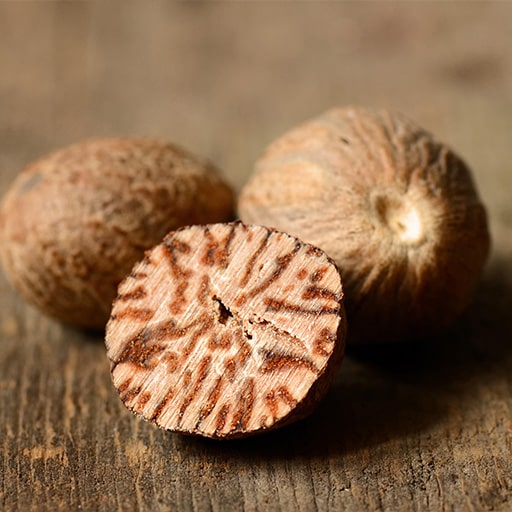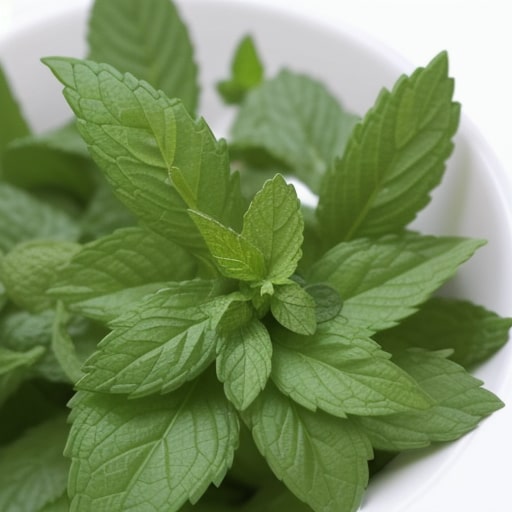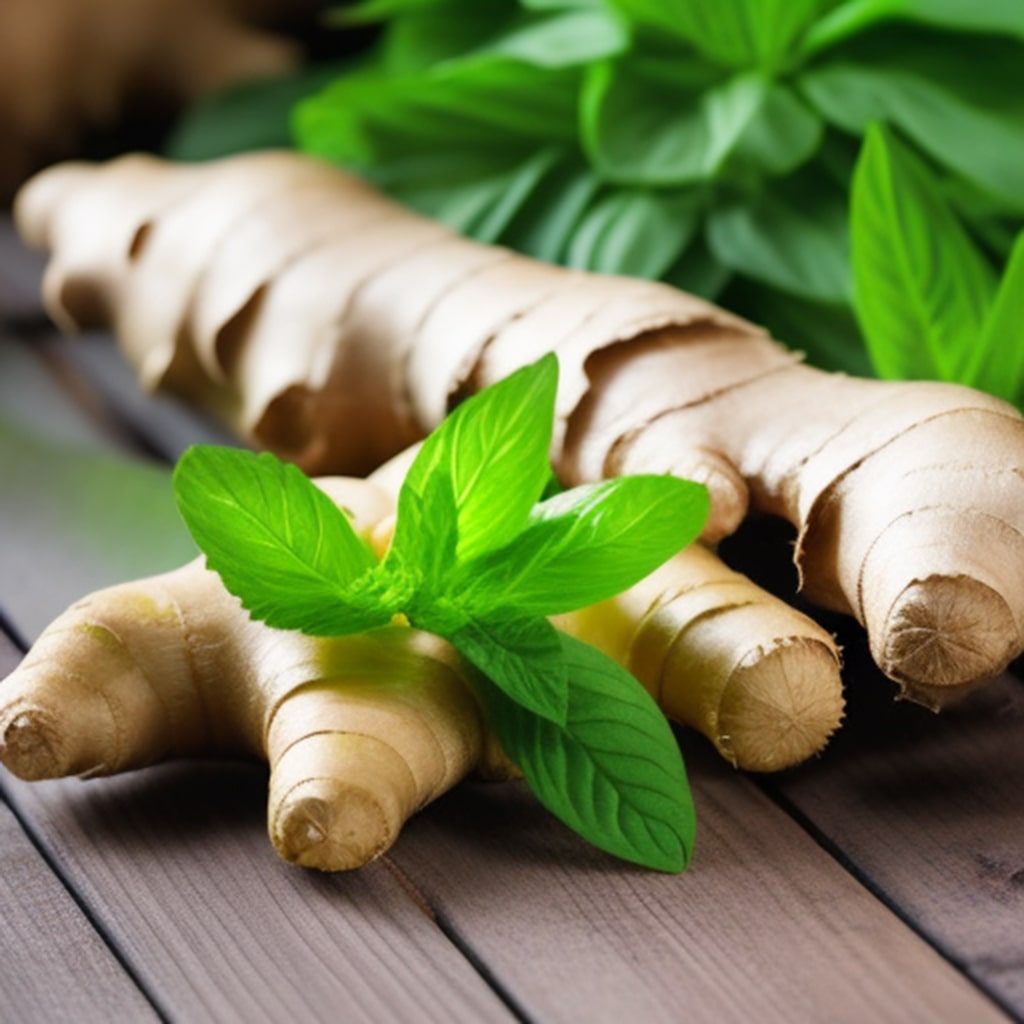Your cart is currently empty!
Blog
-

Nutmeg: More Than Just a Spice
Nutmeg, that humble spice tucked away in the corner of your spice rack, has a rich history and a wide array of uses that go far beyond its role as a seasoning for your favorite dishes. Derived from the seed of the Myristica fragrans tree, native to the Indonesian Banda Islands, nutmeg has been cherished for centuries for its aromatic and flavorful properties, as well as its potential health benefits. In this article, we’ll delve into the fascinating world of nutmeg, exploring its history, culinary uses, medicinal properties, and more.
A Brief History of Nutmeg
Nutmeg’s history is intertwined with the tales of ancient spice trade routes and exploration. It was once a highly sought-after commodity, considered as valuable as gold during the Middle Ages. Nutmeg’s allure led explorers and adventurers to set sail across treacherous seas in search of the mysterious Spice Islands, where the nutmeg tree thrived.
The origins of nutmeg can be traced back to Indonesia, specifically the Banda Islands. These islands were the sole producers of nutmeg until the 17th century when the Dutch managed to establish a monopoly on its cultivation. This monopoly was fiercely guarded, and the Dutch even went as far as destroying nutmeg trees on other islands to maintain their control over this valuable spice.
During this time, nutmeg was considered not only a culinary treasure but also a remedy for various ailments. It was believed to have potent medicinal properties and was used to treat everything from digestive issues to anxiety.
Culinary Uses of Nutmeg
Nutmeg’s warm, earthy flavor is a staple in many kitchens around the world. It adds depth and complexity to a wide range of dishes, both sweet and savory. Here are some common culinary uses of nutmeg:
- Baking: Nutmeg is a key ingredient in many baked goods, including pumpkin pie, spice cakes, and fruit tarts. Its distinctive flavor shines in these treats.
- Sauces and Soups: Nutmeg can be found in creamy sauces like béchamel and Alfredo, as well as in hearty soups and stews.
- Spiced Beverages: It’s a star in seasonal favorites like eggnog and mulled wine, where just a pinch can transform the entire drink.
- Curries: Nutmeg is a crucial element in many spice blends used in Indian and Middle Eastern cuisine. It adds warmth and depth to curries and biryanis.
- Pasta Dishes: A sprinkle of nutmeg over a bowl of creamy pasta can elevate the dish to a new level of sophistication.
Health Benefits of Nutmeg
Beyond its culinary applications, nutmeg has been explored for its potential health benefits:
- Digestive Aid: Nutmeg is known for its ability to aid digestion and soothe gastrointestinal discomfort. It is often used as a home remedy for indigestion and flatulence.
- Pain Relief: Some studies suggest that nutmeg may have mild analgesic properties and could help alleviate pain when used in moderation.
- Anti-Inflammatory: Nutmeg contains compounds with anti-inflammatory properties, which may contribute to its potential health benefits.
- Antioxidant Properties: The spice is a source of antioxidants, which can help protect cells from oxidative stress.
However, it’s important to note that nutmeg should be used in moderation, as excessive consumption can lead to adverse effects, including hallucinations and toxicity.
A Word of Caution
While nutmeg has its merits, it’s crucial to use it in moderation. Excessive nutmeg consumption can lead to nutmeg poisoning, known as myristicin toxicity. Symptoms of nutmeg poisoning include nausea, vomiting, hallucinations, and even seizures. Therefore, it’s advisable to use nutmeg sparingly in culinary creations and consult with a healthcare professional before considering it as a remedy for any ailment.
-

Mint: A Versatile Herb with Countless Benefits
Mint, with its refreshing aroma and distinctive flavor, is a versatile herb that has been cherished for centuries. Whether you’re sipping on a soothing cup of mint tea or garnishing a delicious dessert, this herb has found its way into kitchens, gardens, and holistic medicine practices worldwide. In this article, we will delve into the rich history, various species, culinary uses, health benefits, and practical gardening tips related to this beloved herb.
A Flavorful History:
Mint’s history dates back to ancient times, with documented use in culinary and medicinal applications in both Eastern and Western cultures. Its mention can be found in texts from as early as ancient Egypt and Greece, where it was revered for its soothing properties and refreshing taste. The Romans prized mint for its culinary versatility, using it to enhance their cuisine and create fragrant oils and perfumes.
Diverse Varieties:
Mint is not a single herb but a diverse family of species and cultivars. Some of the most common varieties include spearmint, peppermint, and chocolate mint, each possessing its own unique flavor profile and characteristics. Spearmint, with its mild, sweet taste, is often used in culinary dishes and beverages, while peppermint delivers a potent, menthol-infused flavor ideal for candies and teas. The lesser-known chocolate mint offers a delightful combination of minty freshness and hints of chocolate.
Culinary Delights:
The culinary applications of mint are boundless. It can be used in both savory and sweet dishes to add a burst of flavor. Mint leaves are frequently used in salads, cocktails, and as a garnish for desserts. In Middle Eastern and Indian cuisine, it’s a key ingredient in dishes like tabbouleh and mint chutney. Mint also shines in beverages, from classic mint juleps to refreshing mojitos.
Health Benefits:
Beyond its culinary uses, mint boasts an array of health benefits. Its menthol content can alleviate digestive discomfort and soothe upset stomachs. Mint tea is a popular remedy for indigestion and nausea. Additionally, mint’s natural antimicrobial properties make it useful in oral care products, providing a refreshing and germ-fighting solution.
Gardening Tips:
Growing mint in your garden is not only rewarding but also relatively easy. Mint thrives in well-drained soil and partial sunlight. It’s a resilient herb that can be invasive, so planting it in containers is recommended to prevent it from taking over your garden. Regular pruning helps maintain its growth and flavor.
Conclusion:
In summary, mint is a beloved herb that transcends cultures and centuries. Its rich history, diverse varieties, culinary versatility, health benefits, and ease of cultivation make it a prized addition to any kitchen and garden. So, the next time you encounter the refreshing aroma of mint, savor its multifaceted delights and appreciate the wonders this remarkable herb has to offer. Whether you’re crafting a delectable dish or seeking natural remedies, mint is a true herbal treasure.
-

Unveiling the Incredible Health Benefits of Cinnamon
In the realm of aromatic spices, cinnamon reigns supreme as both a delightful flavor enhancer and a treasure trove of health benefits. For centuries, cinnamon has played a pivotal role in various cultures, not only for its warm and comforting taste but also for its potential to boost well-being. From regulating blood sugar levels to its potent antioxidant properties, cinnamon offers a plethora of advantages that can significantly impact your health. In this article, we explore the captivating world of cinnamon’s benefits and how you can incorporate it into your daily routine.
The Nutritional Profile of Cinnamon
Cinnamon comes from the inner bark of trees belonging to the Cinnamomum genus. This spice boasts an impressive nutritional composition, including:
- Calories: 19 in 1 teaspoon
- Carbohydrates: 6 grams in 1 teaspoon
- Fiber: 4 grams in 1 teaspoon
- Calcium: 26% of the Recommended Daily Intake (RDI) in 1 teaspoon
- Iron: 1% of the RDI in 1 teaspoon
- Vitamin K: 3% of the RDI in 1 teaspoon
Cinnamon’s Remarkable Health Benefits
1. Blood Sugar Regulation
Maintaining Blood Sugar Levels with Cinnamon
Improving Insulin Sensitivity
Cinnamon has gained attention for its potential role in enhancing insulin sensitivity. Research suggests that cinnamon may assist in reducing insulin resistance, thereby aiding in the management of type 2 diabetes. Regular consumption could contribute to more stable blood sugar levels.
2. Antioxidant Powerhouse
Harnessing Antioxidants in Cinnamon
Fighting Oxidative Stress
Cinnamon is a rich source of antioxidants that combat oxidative stress—a culprit in the development of chronic diseases and premature aging. These antioxidants, including polyphenols, help neutralize free radicals and support overall cellular health.
3. Anti-Inflammatory Effects
Easing Inflammation Naturally
Aiding in Inflammatory Conditions
Cinnamon contains compounds with anti-inflammatory properties that may help alleviate inflammation-related issues. While not a substitute for medical treatment, incorporating cinnamon into your diet might offer some relief from inflammatory discomfort.
4. Heart Health Boost
Cinnamon’s Role in Cardiovascular Well-being
Lowering Cholesterol Levels
Studies suggest that cinnamon may contribute to lowering bad cholesterol (LDL) levels, which is a crucial factor in maintaining heart health. By doing so, it could potentially reduce the risk of cardiovascular diseases.
Incorporating Cinnamon into Your Lifestyle
Adding the enticing flavor and health benefits of cinnamon to your daily routine is a simple and enjoyable endeavor. Sprinkle cinnamon onto your morning oatmeal, mix it into yogurt, or use it as a seasoning for roasted vegetables. Additionally, cinnamon can be easily infused into beverages like tea, coffee, or even a soothing warm glass of milk.
Conclusion
Cinnamon’s sweet and warming aroma isn’t just pleasing to the senses; it holds a treasury of potential health benefits as well. From blood sugar regulation to antioxidant-rich properties and potential heart health support, cinnamon is a versatile spice that can complement both your culinary creations and your well-being. Embrace the goodness of cinnamon by incorporating it into your diet, and unlock the remarkable advantages it has to offer.
Resource 1: National Center for Biotechnology Information – Cinnamon: A Multifaceted Medicinal Plant
Resource 2: Healthline – 10 Evidence-Based Health Benefits of Cinnamon
Resource 3: Medical News Today – What Are the Benefits of Cinnamon?
-

Unveiling the Remarkable Health Benefits of Ginger
Ginger, the golden-hued root known for its distinct aroma and flavor, has been cherished for centuries not only as a culinary spice but also for its remarkable health benefits. In this article, we will delve into the world of ginger, exploring its rich history, culinary versatility, and the science-backed health advantages that make it a prized addition to our diets.
Ginger’s Historical Significance:
Ginger, scientifically known as Zingiber officinale, has a storied history that dates back over 5,000 years. It was originally cultivated in Southeast Asia and soon became a valuable commodity in the ancient spice trade routes. Its popularity transcended culinary boundaries, as ginger was embraced for its medicinal properties by cultures worldwide.
Culinary Magic of Ginger:
- Flavor Enhancer: Ginger’s warm, spicy-sweet flavor profile adds depth and character to an array of dishes. Whether used in savory stir-fries, aromatic curries, or sweet treats like gingerbread, it never fails to delight the taste buds.
- Versatile Ingredient: Fresh ginger can be grated, minced, or sliced, making it suitable for a wide range of recipes. It’s equally at home in soups, marinades, sauces, and teas, showcasing its adaptability in diverse cuisines.
- Digestive Aid: Ginger’s natural compounds, including gingerol, lend it a soothing effect on the digestive system. It’s a popular choice for alleviating nausea and indigestion, making it a staple ingredient in many herbal remedies.
The Science of Ginger’s Health Benefits:
- Anti-Inflammatory Powerhouse: Ginger is renowned for its potent anti-inflammatory properties. Studies have shown that gingerol, the active compound in ginger, can help reduce inflammation and may be beneficial in managing chronic conditions such as osteoarthritis.
- Immune Support: With its immune-boosting properties, ginger can help fend off common colds and flu. It acts as a natural decongestant and may ease symptoms like sore throat and congestion.
- Antioxidant Rich: Ginger is loaded with antioxidants that combat oxidative stress, which is implicated in aging and the development of chronic diseases. These antioxidants can help protect cells from damage.
- Heart Health: Some research suggests that ginger may contribute to heart health by lowering blood pressure and cholesterol levels. Its anti-inflammatory properties may also benefit heart function.
Incorporating Ginger into Your Diet:
Adding ginger to your daily diet is a simple yet rewarding endeavor. Whether in the form of freshly grated ginger in your morning smoothie or a soothing cup of ginger tea, there are countless ways to harness its benefits. Experiment with ginger in both sweet and savory dishes to explore its culinary versatility.
Conclusion:
Ginger stands as a testament to nature’s ability to provide us with both culinary delight and profound health benefits. Its rich history, culinary appeal, and scientifically proven advantages make it a staple ingredient worth embracing. Whether you’re a seasoned chef or a health-conscious individual, incorporating ginger into your daily routine can be a small but impactful step towards a healthier and more flavorful life. So, why not savor the golden spice’s magic today?
-

Our pick of the coolest denim jackets this season
Time to invest in the surprisingly versatile spring pick.
-

Jay Ellis Proves One Suit Can Work Four Different Ways
From a dinner date to a client meeting (and a plane ride).